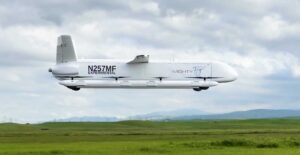
Applications for small drone delivery of food and retail goods are developing around the world – but the opportunity for cargo drones, autonomous eVTOL aircraft with larger payload capacity, may be even greater. Today, MightyFly announced new investment and an AFWERX SBIR Phase II contract to develop the company’s Autonomous Load Mastering System (ALMS.) The ALMS will allow MightyFly’s autonomous hybrid eVTOL “to load, unload and deliver cargo autonomously and to address the most pressing expedited logistics challenges.”
The applications are almost endless, with the potential to relieve traffic and emissions while delivering significant efficiencies and cost savings to any business that requires point-to-point, same-day or expedited delivery services. In the context of military use, an autonomous system for delivering supplies could be lifesaving. “The MightyFly solution is ideal for logistics, supply chain, manufacturing, healthcare, pharmaceutical, retail, automotive and oil and gas industries, for National and State parks, humanitarian and disaster relief organizations, and for defense and nondefense governmental agencies,” says the company announcement.

Air Force SBIR grants are designed to support innovative technologies and bring new solutions to viability sooner. The support not only provides financial resources to small businesses, it identifies market needs and highlights solutions that address specific problems the Air Force is trying to solve.
“The MightyFly team is working to revolutionize expedited logistics via large, autonomous, hybrid eVTOL cargo aircraft. To be chosen by AFWERX for this SBIR Phase II contract signifies a vote of confidence in our mission and technical expertise. We are honored to partner with the U.S. Air Force and to leverage our know-how to develop a system that directly addresses agile and expedited logistics needs and provide a major feature that is needed for the successful integration of autonomous aircraft within logistics,” said Manal Habib, CEO of MightyFly.
MightyFly received additional funding from Draper Associates in September. That investment will help MightyFly advance the development of its autonomous cargo aircraft, boosting the company’s go-to-market efforts.
“We backed MightyFly because of their incredible team. If you absolutely need something delivered right now, MightyFly can deliver it. I suspect MightyFly will save many lives, deliver important contracts, fix many vehicles and machines, and solve many problems we haven’t even thought of yet. For short haul, medium loads, this company has your solution,” said Tim Draper, Founding Partner of Draper Associates.
MightyFly is scheduled to complete the manufacturing of its third-generation MF100 aircraft later this year, is scheduled to publicly debut its autonomous cargo aircraft performing delivery flight demonstrations with 100 pounds of payload in Michigan in 2024, and is working with partners in the planning of Proof of Concept (POC) programs in late 2024 and throughout 2025.
Read more:
- MightyFly Will Demo Drone Delivery of 100 Pounds in Cargo: The Future of Express Delivery
- Flying Basket Cargo Drone Has 100 KG Capacity
- Dronamics Cargo Drone: Black Swan Can Carry 770 Pounds from New York to Texas. Is This the Future of Trucking?
- Drone Cargo Delivery: University of Alaska to Build New Hangar for Base of Operations
- Largest Part 135 Airline in the US Invests in Cargo Drones: Ameriflight Signs Deal with Sabrewing
Miriam McNabb is the Editor-in-Chief of DRONELIFE and CEO of JobForDrones, a professional drone services marketplace, and a fascinated observer of the emerging drone industry and the regulatory environment for drones. Miriam has penned over 3,000 articles focused on the commercial drone space and is an international speaker and recognized figure in the industry. Miriam has a degree from the University of Chicago and over 20 years of experience in high tech sales and marketing for new technologies.
For drone industry consulting or writing, Email Miriam.
TWITTER:@spaldingbarker
Subscribe to DroneLife here.